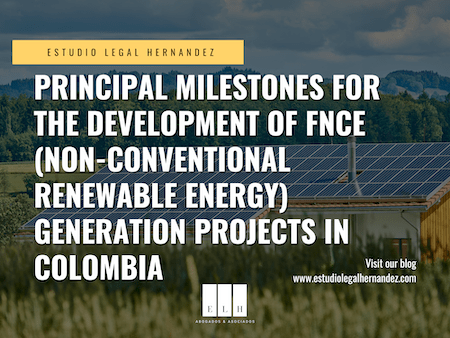By: Juanita Hernández Vidal – Estudio Legal Hernández
DEVELOPMENT OF NON-CONVENTIONAL RENEWABLE ENERGY GENERATION COLOMBIA
Here are the bullet points summarizing the principal milestones for the development of FNCE (non-conventional renewable energy) generation projects in Colombia:
- Principal milestones for the development of FNCE generation projects in Colombia:
1.1. In property matters:
- Conducting a Title Study and evaluating the technical and legal feasibility of the land.
- Determining the useful area of the property and negotiating land use contracts.
- Addressing constructions, restrictions, and easements.
- Establishing electric power easements, among other legal considerations.
1.2. In environmental matters:
- Obtaining environmental licenses from the competent authorities.
- National Environmental Licensing Authority (ANLA) grants licenses for larger projects.
- Regional Autonomous Corporations grant licenses for smaller projects.
- Licenses are required for construction and operation of power plants, transmission lines, and exploration of alternative energy sources.
1.3. Connection to the National Interconnected System:
- Following the regulations defined in CREG Resolution 075 of 2021.
- Registration and study requirements for connection to the SIN.
- Differentiated procedures for class 1 and class 2 projects.
- Allocation of transportation capacity and connection contracts.
- Involvement of the UPME (Mining and Energy Planning Unit) and network operators (OR) for approval and coordination.
1.4. Sale of energy:
- Distinction between the Non-Regulated Market (NRM) and the Regulated Market (RM).
- Non-regulated users with specific power and energy limits can access the competitive market.
- Generation units participate in the spot market through daily energy offers and centralized dispatch.
- Long-term energy contracts can be entered into for the NRM or RM.
- Remuneration options include services related to system reliability and participation in auctions.
1.5. UPME registration:
- Voluntary and informative registration mechanism for generation projects.
- Facilitates compliance with Law 143 of 1994.
- Divided into three phases: pre-feasibility, feasibility, and definitive design.
- Registration certificate renewal required to keep the project on the list.
1.6. Commercial operation:
- Meeting the necessary requirements for commercial operation in the Wholesale Energy Market (MEM).
- Registration with the CND (National Dispatch Center) and providing essential information.
- Coordination of activities and communication with relevant authorities.
- Registering commercial borders with ASIC (Commercial Exchange System).
- Completion of tests, commissioning, and issuance of certificates.
- Declaration of commercial operation coordinated with the CND.
These milestones outline the key steps involved in the development and commercial operation of FNCE generation projects in Colombia.
In ELH we understand the complexities of energy law and the challenges that businesses and individuals face in navigating this area. Our team of expert lawyers has extensive knowledge and experience in advising clients on a range of legal issues, including energy regulation, renewable energy projects, oil and gas exploration and production, power purchase agreements, interconnection, among others.
Our goal is to provide you with effective and cost-efficient legal solutions that meet your specific needs. Please let us know if you would be interested in learning more about our services and how we can assist you.
For more information, please do not hesitate to contact us at contacto@estudiolegalhernandez.com or directly to our ELH team.
________________________________________________________________
Managing Partner ELH
juanita@estudiolegalhernandez.com


